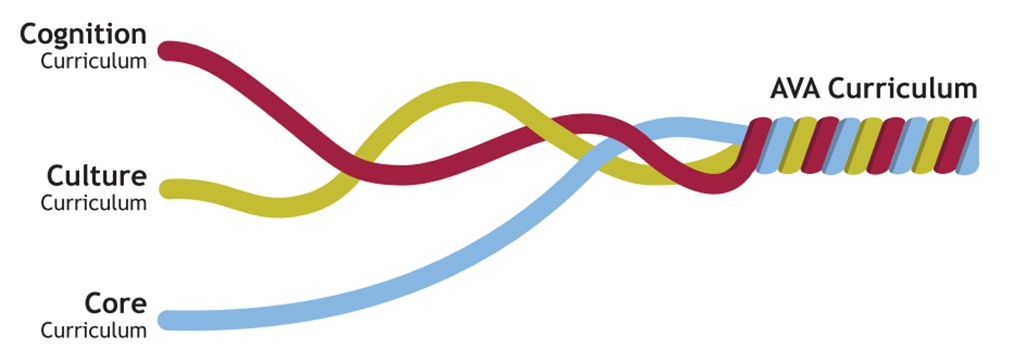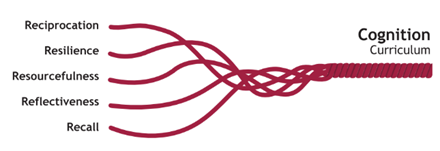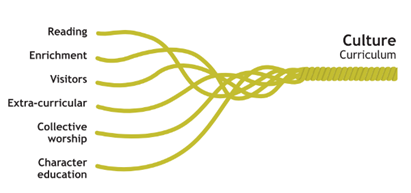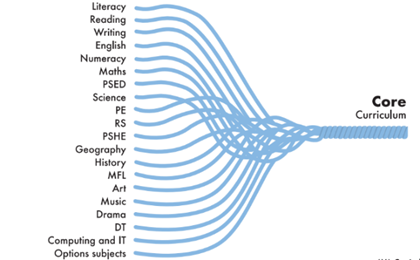
RELIGIOUS STUDIES
» The RS Team
» Curriculum Intent
The Religious Studies Team
Curriculum Leader
Ms K Hanmer - khanmer@theacademy.me
Teachers of Religious Studies
- Mrs A Mccalla
- Miss K Miller
Curriculum Intent

As a Church of England school, the teaching of Religious Education at Aylesbury Vale Academy is central to our curriculum. Our school is enriched by the diverse community in Aylesbury and we aim to provide a challenging and enriching curriculum for all students, that reflect the diverse nature of belief in our school. The school values are Respect, Resilience and Aspiration and these values underpin all that we do as a Religious Education department. We respect all beliefs and world views, we aim to develop resilient learners who engage with challenging topics and respond well to feedback and we believe all students should aspire to be the best they can be.
Our department is one who embraces the Church of England’s vision that…
"The ultimate worth of each person is grounded in being created in the image of God and in God’s love and compassion for each". Church of England Vision for Education Deeply Christian, Serving the Common Good
We hope to reflect this by through our teaching of Religious Education in a two-fold way. Firstly we recognise each student reflects the image of God and we inspire them to be the best they can be. Secondly through our teaching of different worldviews, religions, morality and the teachings of Jesus we hope to develop students who recognise that all people have worth and deserve respect and compassion. We are fully committed to providing a deep education of values, morals, religions and beliefs to enable students to understand and respect of all people in our society as individuals. But to also give them the framework to help them develop and articulate their own views about their belief system.
Cognition Curriculum
 The Bible verse which underpins our school’s ethos is John 10:10 ‘I have come so that they might have life and have it in full.’ For our students to have life in all its fullness we believe RS should help students develop their critical thinking skills and to consider their own responses to ultimate questions of meaning, purpose and value. We believe in helping students develop their own worldview, understand others and become able to discuss difference (and recognise commonality) respectfully and meaningfully.
The Bible verse which underpins our school’s ethos is John 10:10 ‘I have come so that they might have life and have it in full.’ For our students to have life in all its fullness we believe RS should help students develop their critical thinking skills and to consider their own responses to ultimate questions of meaning, purpose and value. We believe in helping students develop their own worldview, understand others and become able to discuss difference (and recognise commonality) respectfully and meaningfully.
We use the Cognition Curriculum to develop this by providing plenty of opportunity for reflection in lessons, when learning about the Prophet Muhammad in Year 7 we consider how important and relevant they are today, we use the ‘Poverty Project’ module in Year 10 to help students reflect on inequalities in the world. We develop reciprocation and resourcefulness in Core RS in KS4 through the use of research and group projects on world religions. Resilience and recall are fundamental to GCSE RS where we utilise a range of recall strategies to secure excellent outcomes at GCSE.
Culture Curriculum
 In RS we contribute to the culture curriculum in a variety of ways. Through Core RS we develop character by studying ethics and discussing morals and ethical ideas and dilemmas with students. Through studying ethics and philosophy we give student cultural capital and a range of lens through how to see the world. We offer RS club and Christian Union as part of the extended schools. We work closely with religious groups, places of worship and communities in the area to provide guest speakers and trip. We enable students to take part in collective worship through facilitating a prayer space.
In RS we contribute to the culture curriculum in a variety of ways. Through Core RS we develop character by studying ethics and discussing morals and ethical ideas and dilemmas with students. Through studying ethics and philosophy we give student cultural capital and a range of lens through how to see the world. We offer RS club and Christian Union as part of the extended schools. We work closely with religious groups, places of worship and communities in the area to provide guest speakers and trip. We enable students to take part in collective worship through facilitating a prayer space.
Core Curriculum
 Key Stage Three
Key Stage Three
The rationale for the Year 7 Scheme of Work is primarily to study in depth what the monotheistic religions believe about God and then to explore how this belief affects the lives of religious believers. The fundamental core running through the Year 7 syllabus is the concept of covenant. The promise God makes to his people and how his people respond to that, the covenant God made with Abraham is fundamental to Judaism, the monotheism expressed in Islam and why Jesus died as part of the new covenant.
The next aim of religious studies is to explore how this concept of covenant is lived out in religious believer’s lives, and students look at this through the lens of the five pillars and help it helps a Muslim to remember God. Through understanding the synagogue and Jewish food laws to truly understand how they keep to their covenant and exploring the way Christians live out their faith through worship, baptism and festivals.
In Year 8 the approach is two- fold in the first term students consider the question ‘Is belief in God still relevant today?’ and they do this through philosophy of religion and examining concepts like unanswered prayers and the problem of evil. This theme is continued through the ‘Do science and religion conflict’ scheme of work. The next part is to look at living faiths in the world today, students study two dharmic traditions of Sikhism and Buddhism and then they explore Christianity as a living faith in Britain and around the world today, through the lens of ‘What does it mean to be a Buddhist/Sikh/Christian’ today provides a critical way to examine the religion and also understand the importance of that religion to religious believers.
Key Stage Four
Religious Studies is statutory for all pupils in Great Britain, we all to fulfil this requirement through core Religious Studies lessons which occur once every two weeks in school. Christianity must be studied as well as two other religions and worldviews. In Year 9 we introduce students to Philosophy of Religion and ‘The Origins’ of life, where we teach students what Philosophy is and how to ask philosophical questions, the ‘Origins of Life’ unit of work looks at concepts of the sanctity of life, origins of the world, worth of humans and animals through the lens of Christianity, Islam and Atheism.
In year 10 we study ethics, firstly ethical ways of thinking (teleological and deontological) and then we look at ‘Matters of life and death’ issues, we look at a range of topics like abortion, euthanasia, animal rights, IVF. By Year 11 we study two topics Religion and Relationships and Religion and Conflict, this enables students to look at key issues which impact their life and how religions respond to them.
GCSE
Some students opt to study RS as a GCSE we study AQA Religious Studies A: Christianity and Islam, the students learn about Christianity and Islam in depth and then go on to study thematic issues and how religions respond to them. This takes place over years 9-11 at GCSE and has two 1hr 45 mins exams by the end of KS4.
Key Stage Five
The objective for KS5 is to build on what they have already studied and apply religious and ethical principles to issues we encounter in the wider world, like Crime and Punishment and Relationships and Families.
